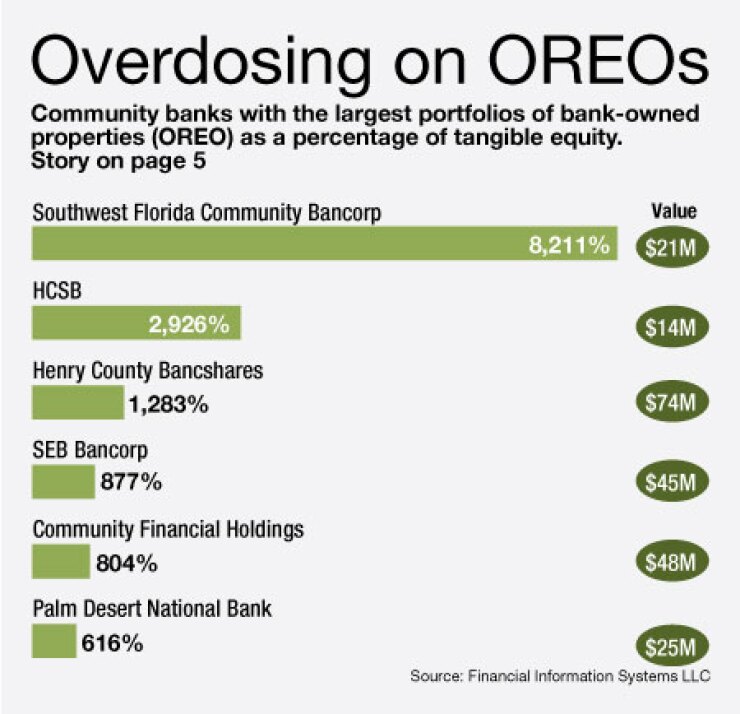-
Thirty-three Senate Democrats said the Obama administration should "quickly and diligently" analyze industry comments to finalize a plan to help turn foreclosures into rental properties.
October 27 -
WASHINGTON — Regulators closed a bank in Louisiana, and another in Iowa, late Friday to bring the year’s failure total to 90.
November 18

With the crush of foreclosures, analysts have implored smaller banks to dump bank-owned properties, even if it means taking a big loss.
Many bankers agree that's what they should do, but mandatory appraisals have been a sticking. Accurate values are hard to come by, so potential buyers are often scared off by appraisals that seem too high, or bankers get skittish that they're selling too low.
As a result, hundreds of community banks still have huge levels of other real estate owned, or OREO, on their books. At Sept. 30, more than 150 banks with assets of $5 billion or less had OREO levels exceeding their tangible equity. Some of those banks have since failed, including Central Progressive Bank in Lacombe, La., and Polk County Bank in Johnston, Iowa.
There is little sign that OREO levels will decline anytime soon, says Steven Sandler, chief executive of Crosswind Capital LLC, a private-equity firm that buys distressed assets. "2012 will be just as heavy a year as 2011," he says.
Brian Olasov, a managing director at McKenna Long & Aldridge LLP, says OREO levels will remain problematic with regulators pressuring smaller banks over appraisals. "As long as some bank examiners deem an appraised value as the be-all and end-all of property loan values, banks will manage property loan books and OREO portfolios to minimize current capital writedowns," says Olasov, who advises banks on real estate holdings. "I don't see that changing, absent legislative fixes."
Action from lawmakers seems unlikely, Sandler says. "No community bank by itself poses any systemic risk," he says.
Appraisers will likely continue to overlook the sales of distressed properties in surrounding areas when valuing properties, Sandler says. That practice will continue to skew values upward, which "may make the boards of the community banks happy because it justifies their continued reliance on extend and pretend, but it doesn't clear the OREO inventory," he says.
Ken Chitester, a spokesman for the Appraisal Institute, says it is difficult for an appraiser to come up with an accurate value when there are few accurate comparable sales to use as a guide. He says the best solution for a community bank is to hire an accredited appraisal company, not an appraisal management company looking to churn out appraisals at the lowest possible cost.
The poor health of the real estate market is not helping. "Until we see the real estate market meaningfully improve, I don't think, particularly on the one-to-four-family-home side, you will see OREO balances significantly work down faster than we've seen in previous quarters," says P. Carter Bundy, an analyst at Stifel, Nicolaus & Co. "It's going to be a long workout processes and there will be a lot of costs involved."
HCSB Financial Corp. in Loris, S.C., said in a regulatory filing that it incurred about $3.3 million in costs tied to OREO for the first nine months of 2011, up 16% year over year. The $544.4 million-asset company said the costs included "legal fees, taxes, insurance, utilities [and] property management company fees."
The federal government is exploring ways to get foreclosed properties off its own books. The Obama administration is looking at a way to convert government-owned foreclosures into rental properties. The plan ideally would help stabilize home values.
Some banks can't dump OREO, because of capital issues. That situation is unlikely to improve much in the near term, says Chris Marinac, an analyst at FIG Partners LLC. "A bank approaching a 4% Tier 1 leverage ratio is going to have to think long and hard on how aggressive it writes down OREO," Marinac says. Falling below such a threshold is "unpalatable" for a bank because it often triggers the Federal Deposit Insurance Corp.'s process of preparing for a failure, he says.
"Some banks don't have the liquidity to write off $300,000," says Rob Whitmire, a partner at Bull Realty Inc., an Atlanta brokerage firm that represents community banks in asset sales. "It's almost an impossible feat for them because, in some cases, it would shut them down."
The lengthy process, required in some states, of getting a judge's approval before a foreclosure can occur is also forcing banks to hold OREO longer than they prefer. While appraisals may be legally required, many bankers feel they can't establish a price range without them. "Appraisals rule the day for most of these community banks, for good or bad," Whitmire said. "They just wait until the appraiser tells them what it is worth."





